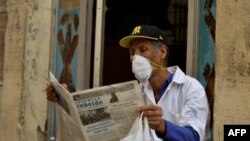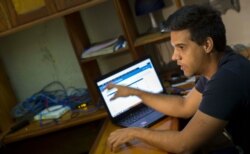Cuba, one of the world’s most censored countries, where the government keeps a tight grip on the internet, and independent news media are considered illegal.
Cubans do their best to work around the censorship, and a key part is played by underground media organizations that share free newspapers or spread news by email chains or even fax.
Helping them is the Cuban Institute for Freedom of Expression and the Press (ICLEP), a local press freedom group active in seven Cuban communities. ICLEP prints and distributes free underground newspapers every two weeks.
“ICLEP is one of the organizations that has been created within Cuba, the only community media network that exists in the country in all the 62 years of the (communist) revolution,” said Normando Hernandez, the group’s director general.
But running an underground media operation comes with risk.
On March 14, agents from the National Revolutionary Police and the political police raided the ICLEP local paper Páginas Villareñas and arrested two reporters. Such raids are becoming increasingly common, Hernandez said, as the government insists on media control.
“One of the things the Cuban regime does is steal our journalistic production tools,” he said. “Not only did they steal our tools. They also stole paper. They stole ink. They even stole personal media from people — a tablet, for example, that was personal.”
Without its equipment, and with no way to replace it due to government-controlled markets, Páginas Villareñas was forced to shut down on March 16.
“It’s an orchestration of censorship tactics trying to silence the remaining and few very courageous journalists who still manage to do journalism under incredibly harsh circumstances,” said Ana Cristina Núñez, senior researcher for South and Central America at the Committee to Protect Journalists (CPJ).
In addition to raids and the confiscation of personal equipment, threats against the journalists and their families are common practice by the Cuban police, with an aim of discouraging citizens from participating in news media that are not state-controlled.
“The threats were not only against them, but they were also threatening their families who were going to lose their jobs. They have taken terror. Literally, they are terrified, and they do not want to continue working. It has been impossible for me to connect with them,” Hernandez said.
Cuba's Mission to the United Nations did not respond to VOA's emails requesting comment.
Cuba offline
The exact number of underground or unofficial news organizations in Cuba is not known. Among the better-known outlets are 14ymedio, Periodismo de Barrio, Havana Times, ADN Cuba and CubaNet.
Censorship and crackdowns on press freedom have been a hallmark of the Cuban government since the communist revolution led by Fidel Castro took power after overthrowing the old leadership in 1959. Until 2008, computers and DVD players were banned.
Now, although Cubans have increasingly greater access to consumer goods, many still lack access to the internet and independent news.
Media analysts and rights groups say the raid on Paginas Villareñas signals worsening repression. In 2019, the government said it would expand internet access to private homes and businesses, but only with government equipment that allows the regime to censor content.
Cuba remains the least-connected country in the Americas. Forced government internet blackouts are frequent. According to Amnesty International, only 25% of Cubans use the internet, and only 5% of homes are connected.
So, independent media are hard-pressed to break through.
“The government controls virtually all media outlets in Cuba and restricts access to outside information,” said Gerardo Berthin, director of Latin America and Caribbean Programs at the advocacy group Freedom House. “Attacks on the independent press in Cuba are continuous and systematic.”
The nonprofit’s Freedom 2020 report on internet freedom scored Cuba 22 out of 100 points, labeling the country “not free.”
Independent journalists also risk being prosecuted or harassed.
Under Decree Law 370, Cuban officials have taken equipment and imposed short-term detentions and fines for speech that is “counterrevolutionary or a threat to public order.”
Other laws provide hefty prison sentences for “providing information to the U.S. government; owning, distributing or reproducing material produced by the U.S. government or any other foreign entity; and collaborating, by any means, with foreign radio, television, press or other foreign media, with the purpose of destabilizing the country and destroying the socialist state.”
Support from rights groups and criticism of censorship hasn’t dented the government’s posture. Rather, last year, authorities adopted extra measures to control the media, including limiting access to virtual private networks (VPNs) and launching online smear campaigns against several independent journalists.
“There’s clearly a pattern of harassment, and we’re worried we’ve seen an increase in these past years,” Nuñez said.
Solidarity underground
The tightening censorship and pressure makes underground outlets like Páginas Villareñas and groups like ICLEP even more important. And there is solidarity with readers, who can take part in reporting, publishing and sharing journalism.
“Inside Cuba, there is a whole journalistic movement. Anyone in the community — not just a person who studied journalism — can participate in this informative process,” Hernandez said.
The country’s first independent news website, Primavera Digital, was founded in Havana in 2007. And readers can also access CubaNet, a news website based in Coral Gables, Florida. CubaNet uses independent press agencies and groups such as farmers and labor unions to help gather its content.
CubaNet describes its content as a way to give citizens the “nongovernmental version of the events and daily life in Cuba.”
The organization sends out free emails and/or faxes. Their email list includes more than 1,000 subscribers, though most are Cuban Americans in the United States.
Páginas Villareñas covers issues of public interest in the seven communities where it prints and distributes issues. The paper recently published an article about a musician detained and beaten by police.
According to Hernandez, the paper has prompted change because the government prefers to fix the problems rather than deal with criticism. Staffers did not want to speak for publication about the raid for fear of retaliation, he said.
“The political police are very upset, because in our pages, we criticize the government's management, the party's management of companies and organizations,” Hernandez said. “We force them to solve the problems that the community complains about.”
The pressure continues
On April 12, journalist Luzbely Escobar from independent news outlet 14ymedio was detained in her own home. When she tried to leave her apartment, she was stopped by a police officer stationed at the bottom of her apartment building. Escobar asked the officer why she couldn’t leave, and she received no response.
Last fall, mobs sympathetic to the Cuban government blocked reporters and cameramen from the Agence France-Presse and Reuters news agencies who were reporting on a demonstration in support of the San Isidro Movement (MSI). Independent journalists, activists and others were arrested. The dissident movement was formed in 2018.
“Journalists in Cuba have many challenges in collecting and distributing news inside the island,” said Berthin of Freedom House. “However, there is also a new energy on the part of the Cuban people to demand their fundamental rights and freedoms.”





